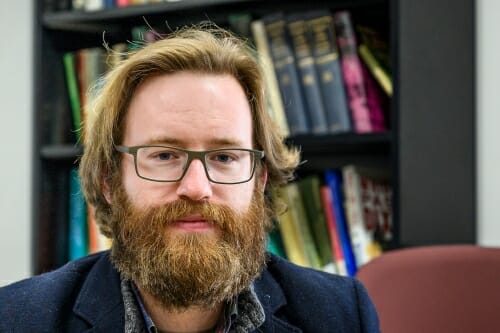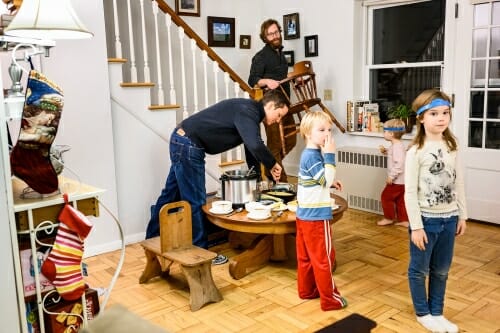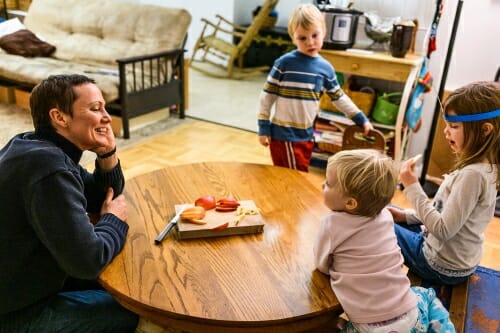Commencement spotlight: The road less taken leads military vet to his ‘dream school’

Parents Noah and Noël Ash, both UW–Madison students, are pictured with their children — Elsa, 7, Orion, 5, and Winifred, 3 —- at their home in University Apartments at UW–Madison. Noah is graduating Dec. 16 with a bachelor’s degree in philosophy and classical humanities. Noël is in her second year of a three-year masters of fine arts program in painting. Photo: Jeff Miller
Noah Ash’s high school grades were fine but nothing special, he says, owing in part to a senior year that found him immersed mostly in a student production of “West Side Story.”
When he realized that UW–Madison, his dream school, was not going to happen academically, he stunned his family and friends by enlisting in the Army.
“I was a theater kid. I lettered in music,” says Ash, who grew up in Watertown, Wisconsin, about 45 miles east of Madison. “It’s not typical for someone like me to sign up for airborne school.”

Undergraduate student and philosophy major Noah Ash, pictured in Helen C. White Hall, is an Army veteran who earned his degree through the GI Bill. “I would not have made it to UW–Madison without the military,” he says. Photo: Jeff Miller
Today, Ash, 31, is an Iraq War veteran and UW–Madison senior who will graduate this month with a double-major in philosophy and classical humanities. His journey, he says, shows there’s more than one path to becoming a Badger.
“I would not have made it to UW–Madison without the military,” he says. “I was given this amazing opportunity, and I have tried my best to make the most of it.”
Academically, he has far surpassed his high school achievements. He is a Vilas Merit Scholar with a GPA of 3.94, and he’s been inducted into Phi Kappa Phi, an honor society that recognizes exceptional scholarship in all academic disciplines. He’s also a junior fellow with the Center for the Study of Liberal Democracy on campus.

At left, Noah clears the table as Noël finishes a fruit dessert with their children. At far right is Noah’s stepmother, Janet Ash, who joined the family for dinner. Photo: Jeff Miller
Ash credits the Post 9/11 GI Bill for making his college education financially feasible. His wife, too, is an Army veteran who is earning a degree at UW–Madison through the bill.
“It’s 100 percent the reason we can both be students right now,” says Noël Ash, 39, who is in her second year of a three-year masters of fine arts program in painting. She anticipates graduating in the spring of 2020.
The two are earning their degrees while raising children ages 3, 5 and 7.
Deciding to enlist
Neither Noah nor Noël comes from a military family. Noah attributes his Army enlistment to “ennui, uncertainty and a desire for adventure.” Noël, a Chicago native, describes her decision similarly.
After high school, she earned a bachelor of fine arts degree in painting and drawing from the Art Institute of Chicago. While waitressing and pursuing an art career in New Orleans, she was displaced by Hurricane Katrina and fled with only what she could fit in her car.
“It was a big ‘What now?’ moment,” she says. “I felt like I needed to start over, and a change to military intelligence seemed exciting.”
Her decision to enlist came out of left field, much like Noah’s. She and her mom threw a party to explain it to the many baffled friends and family members.
Both Noah and Noël served in the 82nd Airborne Division, a unit that specializes in parachute assault operations. They met in 2009 at Fort Bragg in North Carolina.
The highlight of their courtship was sharing meals during an extended training exercise that was otherwise drudgery, Noël says. At one point, Noah roused her early from a deep sleep to let her know there had been a delivery of hot food.

Evenings can be hectic for the Ash family. After the kids go to bed, their parents hit the books. Pictured getting ready for dinner with their children are Noah and Noël. Photo: Jeff Miller
“The fact that he felt confident to judge whether I would rather miss out on sleep or on a hot meal — I can’t explain why, but it seemed terribly romantic to me at the time,” she says.
Noël served 4½ years in the Army as an Arabic language linguist. Noah served eight years as an intelligence analyst, including a 15-month deployment to Iraq. Both appreciate what they gained through military service.
“There’s such diversity in the military,” Noël says. “You hear so many perspectives. It has made me more sympathetic to people on the other side of the political divide. I can’t just blithely write them off.”
Noah says military service gave him both self-confidence and a healthy respect for his own limitations.
“It’s hard to be delusional about your own worth when you can barely pass your push-up test,” he jokes.
Enrolling at UW–Madison
Veterans constitute about 1 percent of enrolled students at UW–Madison.
Military service does not guarantee admittance — a veteran must compete on merit just as any applicant, says Joe Rasmussen, GI Bill benefits coordinator at the campus Veteran Services & Military Assistance Center.

Noël Ash speaks with their children — Elsa, 7, Orion, 5, and Winifred, 3 —- at their home in University Apartments. Photo: Jeff Miller
However, motivated service members can increase their chances by taking ACT prep sessions or college-level classes offered on military bases. And in their admissions essays, they can explain how the traits they’ve acquired in the military make them good candidates for college success, Rasmussen says.
“They can show their growth from high school to who they’ve become today,” he says.
The Post 9/11 GI Bill pays for tuition, housing and books. Noah views the educational benefits as an important and fitting component of the contract between service members and the country.
“Our society seems to think it’s necessary to have a college degree to be employable in a substantial way,” he says. “You can argue over whether that’s right or wrong, but the GI Bill allows veterans to meet that expectation without taking on financial hardship.”
The couple also receives crucial financial help through the university’s Child Care Tuition Assistance Program and through state and federally funded programs for health care and child care assistance.
“Both Noël and I definitely feel privileged to be here, and we’re incredibly grateful for all the assistance we’re receiving,” Noah says.
Adds Noël: “Without the university and government assistance, we’d be incurring a large amount of debt just to cover child care. That really wasn’t a realistic option for us since we’re already sort of behind the earning curve due to starting our careers later in life.”
Even with the assistance, the financial realities have been challenging, especially when all three children were very young. As a sophomore, Noah scaled back to part-time for more than a year so that he could work full time and bring in some needed income as an intelligence analyst for a private military contractor.
Daily life
At first, Noah occasionally wore an Iraq War T-shirt and a pair of Army boots to classes. It was part of his transition from soldier to college student, which was sometimes difficult, he says.
Today, as the couple’s military service fades farther into the past, only close friends and a few professors know of their veteran status, they say. Other roles define them now — parent, scholar, artist.
On a typical weekday, Noël rolls out of bed early at the family’s University Housing townhouse and arrives at her painting studio on campus by 6 a.m. During her first year of graduate school, she painted large family portraits of her neighbors in the University Housing apartments who also were juggling the dual roles of being parents and graduate students. This year, she’s focusing on her own struggle to balance the stresses of motherhood with her career and personal goals.
Noah rouses the kids, feeds them, and gets them off to school and child care. The duties are reversed in the afternoon. Noël picks up the kids and cooks dinner. Noah studies late into the afternoon.
The roles hinge on class schedules. Last semester, Noël took the early child care shift and Noah cooked most of the evening meals.
“Our family time in the evenings is rushed and hectic,” Noah says. “Everyone has usually had a long day.”
The children are in bed by 7 p.m.
“I’m constantly churning in my head all the homework I need to do once they’re asleep,” Noël says.
The couple’s TV, stored in a closet, comes out just once a week — to watch a DVD every Friday on family movie night. Weekends are spent close to home at a park or the Eagle Heights Community Center, where the children can play while the parents study.
The couple will be remaining in Madison at least until Noël graduates. In the short term, Noah plans to stay home with the youngest child and work on writing projects.
His route to UW–Madison took some detours, he says, but it was worth the wait.
“I’ve enjoyed this educational experience a lot. I was given a shot at UW–Madison, and I succeeded.”
Tags: nontraditional, philosophy, veterans




